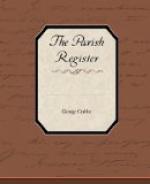Such are our Peasants, those to whom we yield
Praise with relief, the fathers of the field;
And these who take from our reluctant hands
What Burn advises or the Bench commands.
Our Farmers round, well pleased with constant gain,
Like other farmers, flourish and complain. —
These are our groups; our Portraits next appear,
And close our Exhibition for the year.
-------------
With evil omen we that year
begin:
A Child of Shame,—stern Justice adds, of
Sin, Is first recorded;—I would hide the
deed, But vain the wish; I sigh, and I proceed:
And could I well th’instructive truth convey,
’Twould warn the giddy and awake the gay.
Of all the nymphs who gave our village grace,
The Miller’s daughter had the fairest face:
Proud was the Miller; money was his pride;
He rode to market, as our farmers ride,
And ’twas his boast, inspired by spirits, there,
His favourite Lucy should be rich as fair;
But she must meek and still obedient prove,
And not presume, without his leave, to love.
A youthful Sailor heard him;—“Ha!”
quoth he,
“This Miller’s maiden is a prize for me;
Her charms I love, his riches I desire,
And all his threats but fan the kindling fire;
My ebbing purse no more the foe shall fill,
But Love’s kind act and Lucy at the mill.”
Thus thought the youth, and soon the chase began,
Stretch’d all his sail, nor thought of pause
or plan:
His trusty staff in his bold hand he took,
Like him and like his frigate, heart of oak;
Fresh were his features, his attire was new;
Clean was his linen, and his jacket blue:
Of finest jean his trousers, tight and trim,
Brush’d the large buckle at the silver rim.
He soon arrived, he traced the village-green,
There saw the maid, and was with pleasure seen;
Then talk’d of love, till Lucy’s yielding
heart
Confess’d ’twas painful, though ’twas
right to part.
“For ah! my father has a haughty soul;
Whom best he loves, he loves but to control;
Me to some churl in bargain he’ll consign,
And make some tyrant of the parish mine:
Cold is his heart, and he with looks severe
Has often forced but never shed the tear;
Save, when my mother died, some drops expressed
A kind of sorrow for a wife at rest: —
To me a master’s stern regard is shown,
I’m like his steed, prized highly as his own;
Stroked but corrected, threatened when supplied,
His slave and boast, his victim and his pride.”
“Cheer up, my lass! I’ll to thy
father go,
The Miller cannot be the Sailor’s foe;
Both live by Heaven’s free gale, that plays
aloud
In the stretch’d canvass and the piping shroud;
The rush of winds, the flapping sails above,
And rattling planks within, are sounds we love;
Calms are our dread; when tempests plough the deep,
We take a reef, and to the rocking sleep.”




